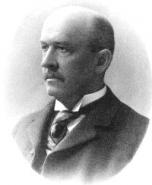Liberty Matters
William Graham as a Social Historian

Philip Magness and David Hart remind us the importance of historical knowledge in Friedrich Hayek's works. By the same token, we should not forget the pioneering role of the Austrian economists at large on this topic, especially Ludwig von Mises.[74]
The enthusiasm for history that emerged at the beginning of the 19th century had a great influence on the social sciences. Born of the crisis of Western societies – caught up in what seemed a sudden acceleration of history – it is natural enough that these sciences should attempt to define the laws governing human destiny. The social sciences were historical by necessity: William Graham Sumner could not conceive of them in any other manner. With the coming of age of sociology, the idea that there could be a "science" of history was the subject of much and varied debate.[75]
And yet the science of history would draw some valuable lessons from the methodology of sociology which was emerging at the time. It was in large part under the impetus of the issues and problems raised by Sumner, increasingly aware of the limits of narrative history, turned so enthusiastically to social and economic history. He then consulted history in order to avoid the twin pitfalls of the philosophy of history and of introspective psychology. For Sumner, singular facts are very important as he noted in a passage in his work Folkways (1906): "The modern historians turn with some disdain away from the wars, intrigues, and royal marriages which the old-fashioned historians considered their chief interest, and many of them have undertaken to write the history of the people."[76]
In this context, some historians came to see written documentation as the key factor in the definition of "scientific" history. The document supported the historian's argument, and it served to demarcate history from the philosophy of history. With the aid of the document, history could at last claim to be an objective science.
But for many social scientists, like Sumner and many others, history was not completely free of philosophy, nor did it renounce systematization. History should then show how people try to meet their psychological and biological needs through institutions. On this, Sumner seems to mix Bastiat and Spencer theoretical standpoints.
To conclude, I would attempt to answer David Hart's question. That is, does sociology have a particular role in spreading ideology and politics ideas. It is well known that Marx and the Marxists played a decisive role. But it is not obvious with other founding fathers of sociology like Émie Durkheim, Max Weber, Gabriel Tarde, and Georg Simmel. Concerning Sumner, it is tough to detect a direct influence. Maybe because he had a very small network. He had no link for example with the Chicago school of sociology and he never published a paper in the American Journal of Sociology, the most important academic journal of his time.
Endnotes
[74.] See Ludwig von Mises, History and Theory, Yale University Press, New Haven, 1957.
[75.] See James Harvey Robinson, The New History, Essays Illustrating the Modern Historical Outlook, New York, The MacMillan Company, 1912. In the Human Comedy (1937), he writes : "It is true that biologists have, many of them, given up what they call 'Darwinism'; they have surrendered Spencer's notion of the hereditary transmission of acquired characters, and they even use the word 'evolution' timidly and with many reservations. But this does not mean that they have any doubts that mankind is a species of animal, sprung in some mysterious and as yet unexplained manner from extinct wild creatures of the forests and plains."
[76.] William Graham Sumner, Folkways, p. 638.
Copyright and Fair Use Statement
“Liberty Matters” is the copyright of Liberty Fund, Inc. This material is put on line to further the educational goals of Liberty Fund, Inc. These essays and responses may be quoted and otherwise used under “fair use” provisions for educational and academic purposes. To reprint these essays in course booklets requires the prior permission of Liberty Fund, Inc. Please contact oll@libertyfund.org if you have any questions.